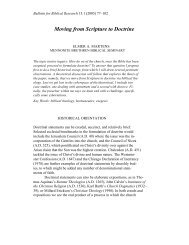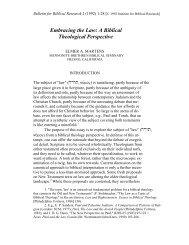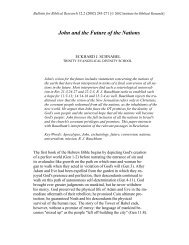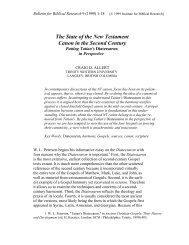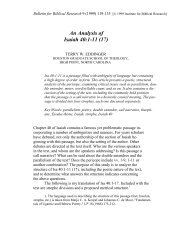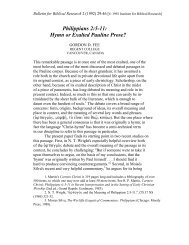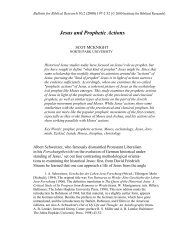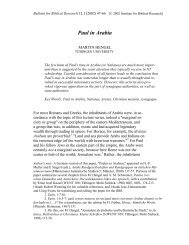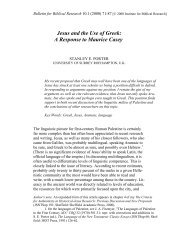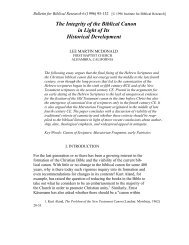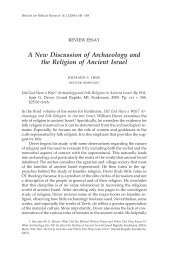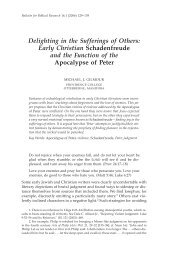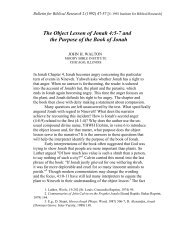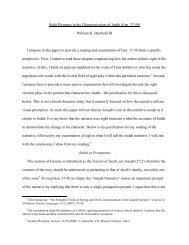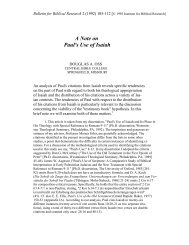Reflections on Exegesis and Spirituality in Philippians 4:10-20
Reflections on Exegesis and Spirituality in Philippians 4:10-20
Reflections on Exegesis and Spirituality in Philippians 4:10-20
You also want an ePaper? Increase the reach of your titles
YUMPU automatically turns print PDFs into web optimized ePapers that Google loves.
FEE: To What End <strong>Exegesis</strong>? 83<br />
pected part of friendship, n<strong>on</strong>etheless, because of both the mutuality<br />
<strong>and</strong> goodwill <strong>in</strong>herent <strong>in</strong> friendship <strong>and</strong> its expected reciprocity with<br />
regard to benefits, the use of "thank you" language was apparently<br />
not expected am<strong>on</strong>g friends. 11<br />
If the social phenomen<strong>on</strong> of friendship expla<strong>in</strong>s the language of<br />
our passage, its placement at the end of the letter is most likely due to<br />
the comb<strong>in</strong>ed <strong>in</strong>fluence of orality <strong>and</strong> Paul<strong>in</strong>e rhetoric. We beg<strong>in</strong><br />
with the matter of orality, not<strong>in</strong>g that the first century CE was primarily<br />
an oral (<strong>and</strong> thus aural) culture. This would have been especially<br />
true for the majority to whom this letter was addressed. All of<br />
Paul's letters, <strong>and</strong> <strong>Philippians</strong> <strong>in</strong> particular, were first of all oral—dictated<br />
to be read aloud <strong>in</strong> the community. Much of Paul's rhetoric comes<br />
<strong>in</strong>to play precisely at this po<strong>in</strong>t. His use of ass<strong>on</strong>ance <strong>and</strong> wordplays,<br />
for example, are "designed" to be memorable precisely because oral<br />
cultures had a very high level of retenti<strong>on</strong>. In literary cultures we are<br />
bombarded by so many words <strong>in</strong> pr<strong>in</strong>t that very few, if any, are kept<br />
<strong>in</strong> memory <strong>in</strong> a precise way.<br />
Rhetoric <strong>and</strong> orality together especially expla<strong>in</strong> why Paul left his<br />
acknowledgment of their gift for the very end. For most of us, such<br />
delay borders <strong>on</strong> rudeness, if not impropriety, <strong>and</strong> for scholars it has<br />
been the source of c<strong>on</strong>siderable speculati<strong>on</strong>. But Paul had a different<br />
agenda. Hav<strong>in</strong>g to this po<strong>in</strong>t dealt with his, <strong>and</strong> especially their, circumstances<br />
12 (basic to letters of friendship) <strong>and</strong> know<strong>in</strong>g full well<br />
what he was do<strong>in</strong>g, Paul c<strong>on</strong>cluded the letter <strong>on</strong> the same note with<br />
which it began (1:3-7), their mutual partnership <strong>in</strong> the gospel, thus<br />
plac<strong>in</strong>g this matter <strong>in</strong> the emphatic, climactic positi<strong>on</strong> at the end.<br />
When read aloud <strong>in</strong> the gathered community, these would be the<br />
f<strong>in</strong>al words that were left r<strong>in</strong>g<strong>in</strong>g <strong>in</strong> their ears: their gift to him has<br />
been a sweet-smell<strong>in</strong>g sacrifice, pleas<strong>in</strong>g to God; God <strong>in</strong> turn, through<br />
Christ Jesus <strong>and</strong> <strong>in</strong> keep<strong>in</strong>g with the "riches" that are his al<strong>on</strong>e <strong>in</strong> the<br />
"glory" <strong>in</strong> which he dwells, will "fill them to the full" regard<strong>in</strong>g all<br />
their needs; <strong>and</strong> that all of this redounds to God's eternal glory.<br />
At the same time, of course, they would scarcely be able to overlook<br />
the exhortati<strong>on</strong>s <strong>and</strong> appeals that preceded, given the predom<strong>in</strong>ance<br />
of these c<strong>on</strong>cerns <strong>in</strong> the large middle secti<strong>on</strong> of the letter. This<br />
is rhetoric at its best. The theory (predicated <strong>on</strong> our own sociology)<br />
that sees a later, rather m<strong>in</strong>dless, redactor "past<strong>in</strong>g" th<strong>in</strong>gs together<br />
<strong>in</strong> this way turns out <strong>in</strong> the end to make him more clever than Paul.<br />
11. See esp. Gerald W. Peterman, "'Thankless Thanks': The Epistolary Social<br />
C<strong>on</strong>venti<strong>on</strong> <strong>in</strong> <strong>Philippians</strong> 4:<strong>10</strong>-<strong>20</strong>," TynB (1991) 261-70.<br />
12. Here especially <strong>on</strong>e needs to note the repeated phrase ta_ peri_ (kata_) u(mw=n (e)me/)<br />
(1:12, 27; 2:19, 23), which is precisely the stuff of letters of friendship. See the discussi<strong>on</strong><br />
<strong>in</strong> my <strong>Philippians</strong> commentary, p. 3 <strong>and</strong> n. 17 <strong>on</strong> 1:12.



